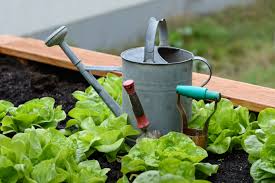7 Vegetable Garden Care and Maintenance Tips

Constructing an edible garden is a great way to connect with nature on the great outdoors, but what I also love about and the edible garden is the time of harvest after all that work would have been put in. Growing an edible garden has so many benefits which we will also be taking a look at a bit later but what I want to draw our attention to is the maintenance of these garden types to ensure that we reap a good harvest.
Whether we are dealing with blubs, ornamentals, shrubs, grasses, ground covers, etc… one thing for sure and that is if we are not practicing maintenance care we will run into some problems as our plants begin to decline.
When a plant begins to decline that’s a sign of our plants talking to us telling us that something is wrong. Too often plants are cared for at the beginning but then left alone to defend themselves which is a big mistake that is made by inexperience. Vegetables are among plants that are neglected also. If we neglect to take care of our veggies how can we expect to reap a good harvest? Following these maintenance practices below will help you to reap the fruits of your labor.
Vegetable garden tips that will yield a good harvest
Watering your veggies
We cannot forget this one that’s sometimes neglected, all plant life needs water to survive if the weather calls for rain then our job will be easier as nature does the job for us other than that we must ensure that our veggies are not only getting water but the right amount for proper growth.
Fertilizers
Fertilizers are plant nutrients that help garden plants to maintain their vigor however when it comes to edible crops my preference is the use of organics. If you prefer using synthetics or man-made fertilizers read the manufactures label before applying for the best results.
Synthetics, if used incorrectly, will cause your veggies to burn, so caution should be taken when using this type especially when applying water-soluble or quick-release. If using manures ensure that it’s dry first because fresh manure will cause veggies to burn.

The soil
Sure your veggies are growing well in the soil type that was chosen or is it. Soil does really matter which means that from the beginning we should plant our veggies in the right soil. The wrong choice of soil can cause major issues.
If your soil needs to be improved although your vegetables have already taken root, you can work in compost, organics, or manure in the first top few inches of soil however if you have to take this route be very careful not to disturb or damage the roots.
Weeds
Weeds are a real nuisance and in my opinion, I believe those who love to spend time in their gardens hate to deal with weeds but we must if our veggies are to grow healthy. Weeds do not only take away the beauty from a garden but weeds will compete with garden plants including veggies for water, sunlight, and nutrients.
Weeds can also take over a garden area killing plants including vegetables. I would stay away from weed killers especially when it comes to edible crops. For a garden setting hand weeding or cultivating the soil by turning it ever so often will help in the control of weeds.
A great way to stay on top of weeds is to put a plan in place so that at certain times you can be in your garden removing weeds. A well-planned program will help make weeding a lot easier.
Garden pests

Garden pests are another issue that must be dealt with, to properly control these pests first identify them followed by applying the recommended pesticide. Because there are so many garden pests it can become confusing as to which pests are attacking your veggies.
As a rule to go by whichever vegetables your planning on growing, get information on which pests are common with that veggie type including information on what to look for. Your garden nurseryman is a good source of information.
Disease
To prevent your veggies from becoming diseased, do not overwater which can lead to root rot, give veggies proper spacing for good air circulation, avoid splashing water on the leaves which happens because of overhead irrigation. Water your veggies from the soil level, some garden insects have been known to transfer disease so keeping insects under control will safeguard against the spread of disease. Keep the plant bed free of debris and other diseased material including infected plants which should be removed. Also, water your veggies in the morning to give the soil a chance to dry, watering too late in the afternoon will encourage disease.
The use of mulch
Mulch has so many benefits and will work wonders for our gardens, Besides its beautification purpose mulch will suppress weeds, retain moisture for plants enriches the soil as it decomposes, and can be used to protect plant roots as an insulator during the harsh winter months. A 2-3 inch layer of mulch is sufficient.
The benefits of an edible garden
Here are a few benefits of and edible garden
1. Growing your own food product in a healthy way.
2. Having a constant supply of these foods.
3. Eating fresh.
4. Cutting that grocery bill by growing your own foods.
5. Working in your edible garden is a great physical activity.
6. Educating children about the importance of plants and helping to sustain one’s selves.
Good Advice-At least once a week do an inspection of your garden this way you will be able to see issues arising so you can deal with them before it becomes a major problem.
The final word on vegetable garden care
To reap a good harvest will take some effort on your part, your veggies need your help to thrive. Remember plants are living things no matter the type or size and vegetables are no different they need your support and care so they can go to work for you.
By investing a part of your time in your garden let’s say once or twice a week is all that your veggies need to grow healthy. I have had a few of these gardens before so I know what it takes to reap a good harvest so why not do the seem because following these maintenance practices will also give you success.
About the author
Norman loves being in the garden, both at home and for his job....
he is 'Natures Little helper' being outdoors, growing his vegetables and flowers from an early age.
Now having spent over 22 years in the profession he want to give some of his knowledge to others...
his vast array of hints and tips you will find scattered over this site will help you no end growing plants in your garden.

I agree so violently with this notion of plants too often being cared for in the beginning but later being left alone to defend themselves. A truly aware and observational thought. I’ve seen this with so many people. My brother, my mother, an acquaintance – they all had big plans when they first wanted to create something like this. But that lack of commitment, lack of resilience and not continuing to do what necessary and not caring for the plants till the very end kind of killed the whole thing.
Overall, I found this to be a very educational one. The section on garden pests – hadn’t thought of that. It makes sense, I will have to get good at knowing these guys well. Mulch also definitely sounds like the kind of thing I will need. Thank you.
I appreciate it, cheers.
Our plants/veggies are depending on us so we should do all that we can to keep them growing healthy. So happy to help, wishing you the best of success.
Very informative and interesting article. I never knew about the benefits of mulch and will definitely be implementing it in my garden :).